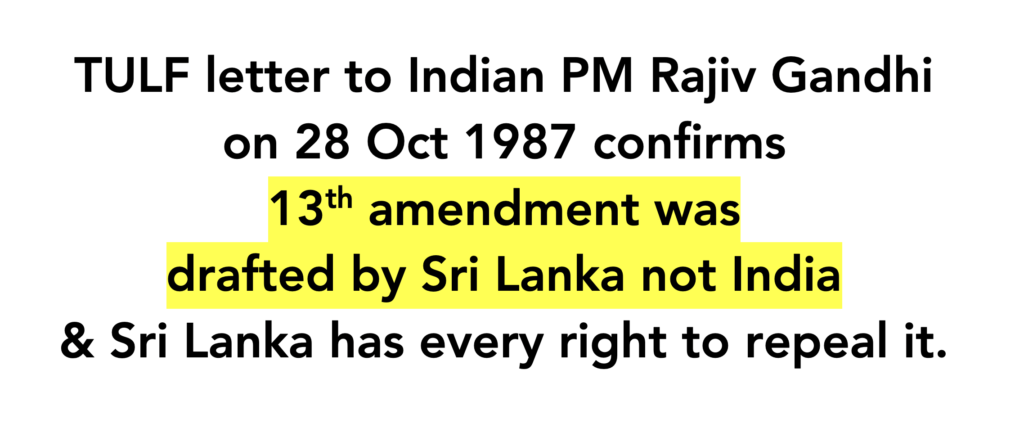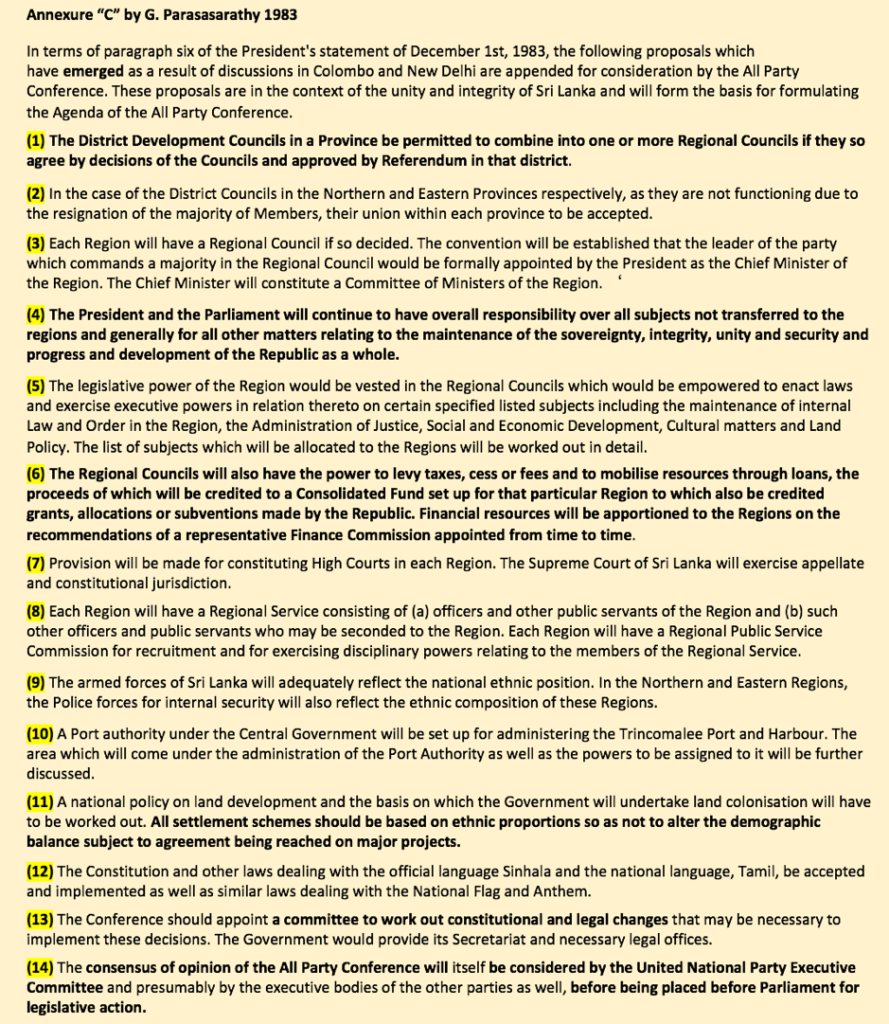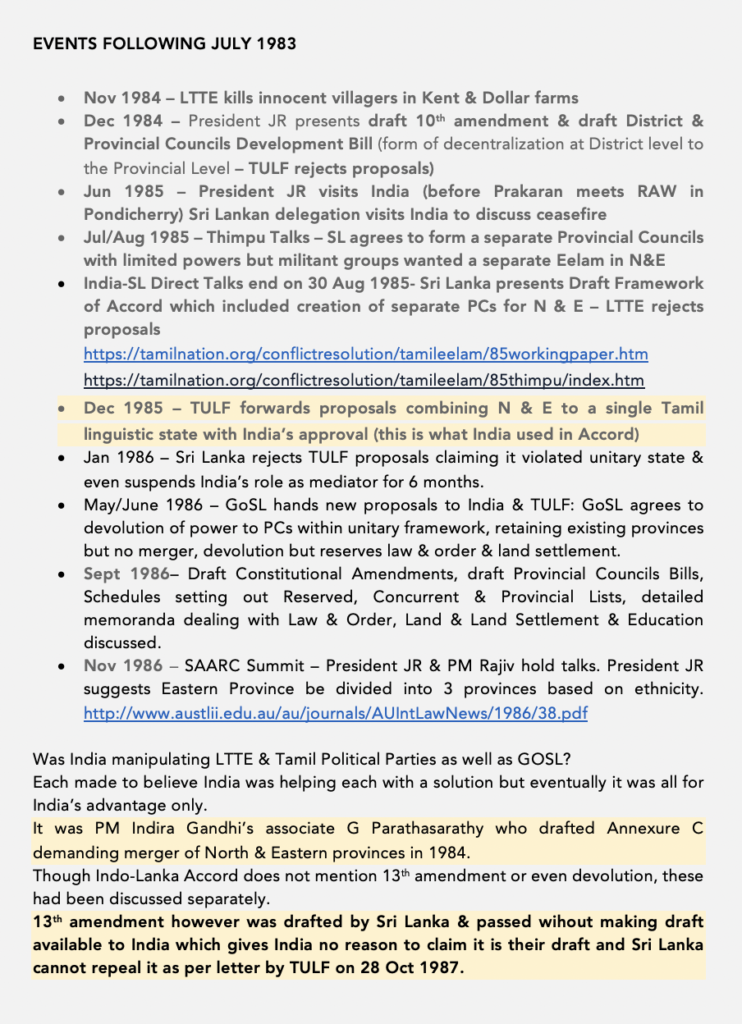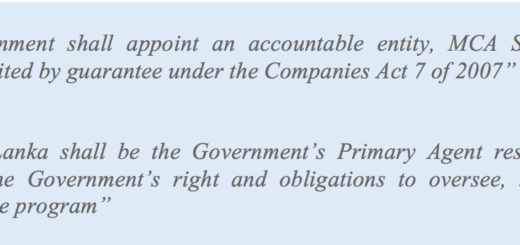TULF letter to Indian PM Rajiv Gandhi on 28 Oct 1987 confirms 13th amendment was drafted by Sri Lanka not India & Sri Lanka has every right to repeal it.

The Indo Lanka Accord proposes an interim-arrangement administrative system by merging North & East provinces & a referendum in the East one year after signing the agreement to continue merger or not (catch was the inclusion of the postponement clause by the President of SL). The Accord does not refer to administrative system for any of the other provinces nor devolution nor the need to amend the constitution. If so, wo proposed 13th amendment, who drafted it & who wanted to get it passed by Sri Lanka’s Parliament? These are questions that should be asked even after 36years especially those peddling the “we cannot anger India” “we have to comply with India” sing song. If 13th a was drafted by Sri Lanka & 13tha is not mentioned in the Indo-Lanka Accord it means Sri Lanka has every right to repeal it in toto.
TULF’s letter to the Indian PM on 28 October 1987 days before the 2 Bills were passed in Sri Lanka’s Parliament on 14 Nov 1987.
- TULF disagreed with both Bills (13th amendment & PC Council) Sampanthan was one of the 3 signatories of this letter.
- The key point from this letter is that both Bills were not drafted by India & as per TULF letter India had not even seen the draft & it had been gazetted without showing India. If 13th amendment was drafting by Sri Lanka (wonder who) then India has no say in deciding whether Sri Lanka keeps or removes 13th
- TULF concludes their letter by requesting the Indian PM to ask Sri Lankan President not to proceed with the 2 Bills until the issues highlighted in letter are resolved.
- If 13th a was drafted by Sri Lanka & 13tha is not mentioned in the Indo-Lanka Accord it means Sri Lanka has every right to repeal it in toto.
28 Oct 1987 – TULF’s letter to PM Rajiv Gandhi provides a clue to the evolution of 13amendment. Note this letter is written after TULF has read the contents of the 2 Bills.
https://sangam.org/letter-pm-rajiv-gandhi-tulf-13th-amendment (letter signed by R Sampanthan / M. Sivasithamparam & A Amirthalingam – only Sampanthan is alive)
- TULF claims disappointment in the 13th amendment Bill & PC Council Bill
- TULF claims both Bills “do not meet aspirations of the Tamil people” (why is TNA & Sampanthan now demanding full implementation when he signed a letter to Indian PM saying both do not meet Tamil aspirations?)
- TULF claims it “cannot recommend the contents of these Bills to the Tamil people”
- TULF claims that the 13tha and PC are being “foisted on us without any Indian expert playing a part in the drafting” (do we take this to mean that 13a & PC were drafted by Sri Lanka & not India – if so India has no stake in it at all, and no one needs to play the scare tactics)
- That India was not aware of draft is further strengthened as a TULF delegation went to meet President JR on 29 Sep 1987 to make a formal request to show the draft to India.
- TULF admits that the Bills were gazetted without being made available to India.
TULF on North East Merger
- That PM Rajiv had to persuade President JR to agree to one administrative unit merging North & East with one PC, one Governor, one Chief Minister & one Board of Ministers & its continuance subject to referendum on or before 31 Dec 1988 with the catch of postponement by the President.
- The setting up of the single administrative unit to be done by executive act by the President in the form of a proclamation which can be revoked (therefore there was no requirement for any amendment to the Constitution to merge NE) – This seriously questions why 13th amendment & PC Bill was introduced at all if the NE temporary merger was to be done by Presidential Proclamation.
How 13th Amendment & PC Bill included devolution to ALL PROVINCES
- Topic discussed before signing of Indo Lanka Accord in July/Aug 1986 between GoSL & TULF. TULF claims GoSL agreed that Governor would be ceremonial head & legislative powers to be near absolute (this is unconstitutional)
- TULF claims that parties to the negotiations re devolution believed legislative & executive powers to be similar to that in an Indian state.
- The reference to “Provincial Councils” (plural) denotes that the inclusions of PCs stemmed from GoSL/TULF discussions and not Indo-Lanka Accord.
Executive Power in the Provinces
- Powers of President retained by Governor in accordance with Article 4(b) exercised on Presidents direction.
- GoSL indicated number of ministers of the province should not exceed 1/3 of total number of members
- North Eastern Province to have 71 members (the letter does not mention other provinces)
- TULF wanted not more than 1/5 of total number of members.
- TULF claims Ministers are restricted to 4
List of Subjects
- TULF wanted the list to conform to Indian pattern
- TULF claims the concurrent list is loaded, provincial list reduced
- TULF claims Fisheries other than beyond Territorial Waters, Agriculture, Animal Husbandry, Industries, Redemarcation including creation of Districts, Assistant Government Agents divisions, and Grama Sevaka Divisions, restoration, reconstruction of destroyed towns, villages, properties, compensation or relief to persons who have sustained loss or damage, palmyrah plantation and palmyrah industry, coconut plantation and industry related thereto, the ownership, management and control of state-owned industrial enterprises within the province dependant wholly or mainly on raw materials found in the province (recommended by the Political Parties Conference), Co-operative Banks, Prisons, Provincial Public Service, Provincial Public Services Commission, Local Government Service, Inquiries, Surveys and Statistics for any of the purposes in the Provincial List and such others have not been included in the Provincial List
- TULF claims powers of PC for Education are substantially curtailed even in secondary education.
- TULF claims both Concurrent & Reserve List minimizes scope & content of Councils power.
Land & Land Settlement
- TULF claims that as per Appendix II is worse than Appendix attached to proposals on 23 Sept 1986 (before signing of the Indo Lanka Accord)
- TULF disagrees to include State Land in Reserve List
- TULF disagrees to State Land vested in the Republic & the power of President to dispose of Land
- TULF claims Province has no right to use of State land though it is a devolved subject
- TULF claims province is restricted to administer & control land made available to it
- TULF claims that it is the prerogative of the President to dispose State Land to a citizen or organization according to laws
- TULF says the Cumulative Entitlement of the Tamil speaking people in schemes under the Mahaweli Project in the Eastern Province has failed as Appendix II has not been incorporated to Annexure on settlement in Eastern province under Mahaweli Project.
- TULF states that though land is a devolved subject, Central Govt has dominant power over State Land
- TULF also claims that there is ‘continued colonization of the Northern & Eastern provinces with members of the majority community” (what about Tamils migrating outside of N & E – is this not colonization?)
Trincomalee Port
- Ports has been included to Reserve List & Trincomalee comes under central control. Annexure C (finalized in 1984) says “A Port Authority under the Central Govt will be set up for administering the Trincomalee Port & Habor. The area which will come under the administration of the Port Authority as well as the powers to be assigned to it will be further discussed” TULF had raised objection to this.
(Trinco Port is only referred in the exchange of letters between President JR & PM Rajiv & not in the Indo Lanka Accord – but 13a had been discussed before the Accord)
- TULF claims Annexure C was finalized in 1984 & an extent of 5150 acres of land around the Trincomalee Port was vested in the Port Authority. TULF claims this could create a new town with racial overtones & cause conflict seen by recruitment to port since 1983)

Provincial Public Service
- Provincial Public Service & Provincial Public Service Commission is included in draft Bill contrary to the draft proposals amending constitution on 23 Sept 1986.
- Appointment, Transfer, Dismissal, Disciplinary control of Provincial Public Servants vested with Governor subject to presidential directors is not what TULF proposed under provisions of Article 55 which vests above with the Cabinet of Ministers.
- TULF claims the subjects of the Provincial Public Service & Provincial Public Service Commission are omitted from the Provincial List & the Provincial Board of Ministers have no control over their functions.
- TULF claims that the chapter pertaining to PCs enables Parliament & the Executive to circumvent the exercise of powers conferred on the province.
Tamil as Official Language
- TULF claims that clause 2 of 13a that makes Tamil an Official Language is nullified in Paragraph (4) which states “Parliament shall by law provide for the implementation of the provisions of this Chapter”.
- TULF claims that the Constitution provides the manner of use for Sinhala Language which is not so for Tamil
- TULF claims there are other matters & therefore requests the Indian PM to ask President Jayawardena “NOT TO PROCEED WITH THE TWO BILLS IN PALIAMENT IN THE PRESENT FORM TILL THE MATTERS REFERRED ARE DISCUSSED & RESOLVED TO THE SATISFACTION OF THE TAMIL PEOPLE”.

It is time we start asking questions and getting proper answers
Shenali D Waduge







